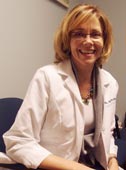Teaching and Evaluating Surgical Skills

Helen MacRae
|
When Helen MacRae
completed her ten year
term as Director of
the Surgical Skills Lab
recently, she was given
a whimsical fur-lined
lab coat created by her
appreciative staff. She
always feels cold in the
air conditioned environment
of the lab. “The
most fun has been working
with the people - the
staff, residents and faculty
who I get to know across all the divisions and would
not ordinarily meet in my general surgery and colorectal
practice at Mount Sinai Hospital.” The combination of
learning, teaching and informal conversation has been
an enriching experience. The medical students have
also been active in the lab thanks to a program set up
by David Backstein and continuing now under George
Christakis.
Helen has been primarily involved in the PGY1 group.
She enjoys getting to know the surgery residents and then
following them later when they come on her service. In
the future, she anticipates that the Skills Lab will become
more integrated into the residency in the way that the
orthopaedic Curriculum Based Competency program
integrates laboratory skill building into the residents’
clinical work (see also: http://www.surgicalspotlight.ca/ Article.aspx?ver=Summer_2010&f=ResidentsCorner).
Teamwork training in the lab has been a focus of study of
the Obstetrics Department. This program will be moved
into other Surgical Divisions. Ara Darzi’s program at
Imperial College, London is studying team communication
during simulated crises (1). “We will need expansion
of our facilities, especially of the virtual operating room,
to strengthen this program. Our former colleague,
Lorelei Lingard videotaped interactions in the operating
room to show how easily surgeons’ “clear” communication
has been misinterpreted. Video feedback has been
explored to teach surgical technique. “It did not enhance
performance significantly the way it does in sports. This
may be related to the scale of the movements in surgery.
Deconstruction of skills into building blocks such as
instrument handling and knot tying are extremely effective,
however, and residents learn how to automate these
skills.”
Helen has been interested in the attention resources of
learners. “Residents need to use more of their attention
resources than faculty, for whom many things have
become automatic. Faculty are better able to operate
while having conversations. It is not as easy for a less
experienced resident. The team showed that residents
who are trained in
|
technical skills are able to attend to
other learning in the operating room, whereas novice residents
were less able to retain information from a script
read to them while closing an abdomen (2). There is an
important lesson here regarding operating room teaching
of novice surgeons. Carol-anne Molton has written (3)
about the importance of slowing down when required by
the situation. For example, music in the operating room
can be a distraction, occupying the attention resources of
the personnel. “That’s why you turn the radio off when
a crisis arises”.
“Teaching fundamental skills should be done without
pressure. For example, my son is a basketball player -
you don’t teach him to shoot during a game, but during
practice in a less stressful situation. In surgery, we usually
do the opposite.” Helen is leaving a busy lab that many
members of the department have accepted enthusiastically.
“Richard Reznick and Zane Cohen got it started,
and Carol Hutchinson was the first director for 18
months. Luckily, Lisa Satterthwaite was here when I
took over.” Helen relates her success to her husband
Brent, to Lisa and the staff in the laboratory, and to her
clinical secretary, Firdeza, who was a family doctor in
Yugoslavia. Their help has made it possible for her to
raise her two children ages 13 and 15, keep up a busy
practice and have a successful academic career.
Helen is working with Master’s in Education students
- developing technical skill certification as a potential
component of Board Exams, which currently test only
knowledge and judgment. “There is only one point on
the ITER for technique. We need to develop skill assessment
for certification.” She is working on this with the
American Board of Colorectal Surgeons and has run a
pilot study, unique in Surgery, in which she compared
the technical skill of general surgeons and colorectal surgeons
in an eight station examination. She will continue
to work on this project and will stay in touch with the
laboratory as well as work with the American College of
Surgeons.
M.M.
1. Aggarwal, R.; Ward, J.; Balasundaram, I.; Sains, P.;
Athanasiou, T.; Darzi, A. Proving the Effectiveness of Virtual
Reality Simulation for Training in Laparoscopic Surgery.
Annals of Surgery. 246 (5):771-779, 2007
2. Palter, V., Grantcharov, T.,Harvey, A., MacRae, H. Ex Vivo
Technical Skills Training Transfers to the Operating Room
and Enhances Cognitive Learning: A Randomized Controlled
Trial. Annals of Surgery, 253 (5): 886-889,2011
3. Moulton, C., Regehr, G, Lingard, L., Merritt C., Macrae,
H. Slowing down When You Should’: Initiators and Influences
of the Transition from the Routine to the Effortful. Journal of
Gastrointestinal Surgery, 14.6: 1019-1026, 2010.
|